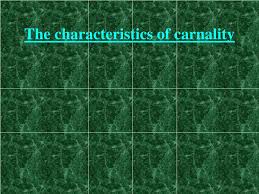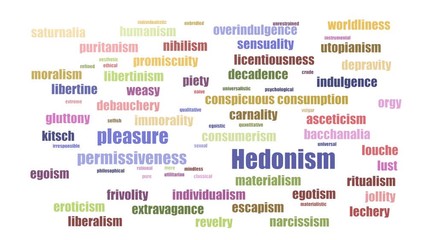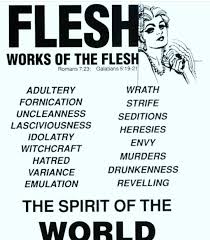Carnal, the root word for carnality, is a word that covers a plethora of common behaviors. How do these behaviors fit into the life of a Christian? Let’s find out as we take a close look at; what is carnality?
What is Carnality
One of the ways that Satan’s assaults manifest themselves on a Christian is through carnality. Carnality is a condition which is the result of being carnal. So what does it mean to be carnal?
To be carnal is to be sensual, worldly, non-spiritual; relating to or given to the crude desires and appetites of the FLESH or body. The apostle Paul distinguishes spiritual individuals— those who are under the influence of the Holy Spirit—with those who are carnal-those under the influence of the flesh (1 Cor. 3:1-4; Rom 8:5-7). The word carnal is usually found in the New Testament to describe those who are worldly—led by their flesh. So now the question becomes, what is flesh?
The scriptures refer to the flesh numerous times. In fact in the King James Version, the word flesh appears 420 times in four different applications. So to lay a foundation for this article and this series, let’s look at these four applications.
The first application is the physical bodies of humans or animals. When God removed a rib from Adam with which he created Eve, he closed up the opening with flesh. Let’s look at this in Genesis 2:21
21 And the LORD God caused a deep sleep to fall upon Adam and he slept: and he took one of his ribs, and closed up the flesh instead thereof;
The apostle Paul spoke of the flesh of men, beasts, fish, and birds. Let’s look at this in 1 Corinthians 15:39
39 All flesh is not the same flesh: but there is one kind of flesh of men, another flesh of beasts, another of fishes, and another of birds.
For the second application, the word flesh is also used in a figurative sense. The imagery of flesh expresses several different ideas in the Scriptures. It doesn’t only include the “fleshy” parts of the body the word could additionally denote the entire body. We can find an example of this in Colossians 1: We’re going to look at a description of how Christ’s death provided reconciliation with God through the death of His body. Verses 21 reads:
21 And you, that were sometime alienated and enemies in your mind by wicked works, yet now hath he reconciled
Now here in the next verse, we see the use of flesh to describe the whole body—it reads:
22 [In the body of his flesh] through death, to present you holy and unblameable and unreproveable in his sight:
Now from this idea, the concept of a fleshly or human bond between people come into play. For example: a man and his wife “shall become one flesh” Let’s go back to Gen 2:24
24 Therefore shall a man leave his father and his mother, and shall cleave unto his wife: and they shall be one flesh.
Also, a man can tell his family “I am your own flesh and bone.” Let’s look at this in Judges 9:2
2 Speak, I pray you, in the ears of all the men of Shechem, Whether is better for you, either that all the sons of Jerubbaal [jer uh BAY uhl], which are threescore and ten persons, reign over you, or that one reign over you? remember also that I am your bone and your flesh.
Now here we have Abimelech’s bid for king of Israel, and he closes it by reminding them that he was a relative that he was of their bone and flesh.
Christ Himself was described as being “in the flesh.” Let’s look at this in 1 John 4:2
2 Hereby know ye the Spirit of God: Every spirit that confesseth that Jesus Christ is [come in the flesh] is of God:
Moving on to the third application “Flesh” is even used occasionally to describe all of mankind. Let’s go back to Gen 6:3
3 And the LORD said, My spirit shall not always strive with man, for that he also is flesh: yet his days shall be an hundred and twenty years.
For the fourth application, last but certainly not least, in an even stronger sense, flesh is the earthly part of man, representing lusts and desires. This application is the focus for this series on carnality. In this context, flesh represents man’s sinful nature: the human, sinful, depraved, and corrupt nature of man. Let’s look at this in Eph 2:3
3 Among whom also we all had our conversation in times past in the lusts of our flesh, fulfilling the desires of the flesh and of the mind; and were by nature the children of wrath, even as others.
We all are born with the nature, the inclination, of fulfilling the desires of our flesh “by nature the children of wrath.” More on this to follow.
The scriptures also inform us that the flesh in this context is contrary to the Spirit. Let’s look at Gal 5:17
17 For the flesh lusteth against the Spirit, and the Spirit against the flesh: and these are contrary the one to the other: so that ye cannot do the things that ye would.
Gal chapter 5 continues on in verses19-23 contrasting works of the flesh with the fruit of the Spirit – the Holy Spirit.
So we know that carnality is the result of being led by the flesh in the context of the lower—base part of man—the sinful nature.
The Dangers of Carnality
Now the title of this series is, The Dangers of Carnality. So the question becomes, what are the dangers of carnality? The main danger of carnality (the leading by the flesh) is the manifestation of habits and behavior that led us into sin. This is the main danger of carnality. To put it more simply: Flesh makes us sin. Flesh causes us to do things that we know—that we as Christians—shouldn’t do. Nobody explains this better than the apostle Paul.
Let’s look at Romans 7: In this chapter, Paul addresses the law and sin. Specifically in verses 13-25, he addresses the fact that the law cannot save us from sin and the fact that there is a struggle between two natures. Looking at verse 12 it reads:
12 Wherefore the law is holy and the commandment holy, and just, and good.
Now we must constantly remember that there is nothing wrong with the law of itself. [e.g. The Ten Commandments—the base of the law] The law was given by God
and was therefore perfect as an expression of His will for His people. The weakness of the law lies in the “raw materials” it has to work with, the sinful nature. It was originally given to people who were already sinners. God’s people needed the law to give them the knowledge of sin, but beyond that we needed a Savior to deliver us from the penalty and power of sin. As I often say, the law condemns and convicts, it does not give the power to obey. This was the purpose of Christ’s life and sacrificial death. So the law itself is good. Paul goes on in verse 13:
13 Was then that which is good made death unto me? God forbid. But sin, that it might appear sin, working death in me by that which is good; that sin by the commandment might become exceeding sinful.
Here again “what is good” is in reference to the law. Paul brings up the question and asks; did the law become death to me? In other words, is the law the cause, dooming Paul (and all the rest of us) to death? The answer, of course, is certainly not! The fact is; Sin is the cause. The law didn’t originate sin, but it showed sin for what it was. “By the law is
the knowledge of sin” [Rom. 3:20b] But that is not all! Our focus lies in a question which is how does man’s sinful nature responds; when God’s holy law forbids it to do something? The answer is well-known. What may have been a sleeping desire instantly becomes a burning passion! [e.g. the forbidden fruit] —Satan used the law for his own evil purposes. So as Paul wrote in this verse, “sin through the commandment becomes exceedingly sinful.”
The fact is this: The law by itself can neither improve the old nature on the one hand nor cause it to sin on the other. It can reveal sin, just as a speedometer reveals the speed of a vehicle. But a speedometer is limited in that it cannot control the speed only an accelerator can control the speed. So it is with the law—it cannot control sin—only the Holy Spirit can control sin. Therefore, the law cannot save us. Let’s look at Romans 3:20
20 Therefore by the deeds of the law there shall no flesh be justified in his sight: for by the law is the knowledge of sin.
But what actually happens and is also the focus of this article is this. Man’s fallen human nature—the flesh, instinctively wants to do whatever is forbidden. So sin uses the law to awaken otherwise-dormant lusts in the sinner’s life. The more effort man puts in, the worse the situation gets, until finally he is brought to have no hope. So sin uses the law to cause any hope of improvement to die in him. And he observes the extreme sinfulness of his old nature as he never saw it before. Paul goes on to say (back to chap 7)
14 For we know that the law is spiritual: but I am carnal, sold under sin.
Here Paul addresses the conflict between the two natures and the impossibility of finding deliverance from the power of indwelling sin through his own strength. Paul acknowledges that the law is spiritual—that is, holy in itself and given for man’s spiritual benefit. But he realized that he was carnal
because he was not experiencing victory over the power of indwelling sin in his life (I’ll address indwelling sin shortly). He was as the scripture reads, sold under sin. He felt as though he was sold as a slave with sin as his master. When in fact all of us were born, we were sold into slavery with sin as our master. Let’s look at Romans 5:12.
12 Wherefore, as by one man [Adam] sin entered into the world, and death by sin; and so death passed upon all men, for that all have sinned:
What this means is that because of Adam, we are stuck with inherent—indwelling sin. We inherited sin from Adam; it’s in us, our DNA. This is why you never have to train children to be bad…they are born bad, disobedient. They have to be trained to be good.
We are all born with sin as our master. Which is why Jesus said: “unless a man be born again, he cannot see the kingdom of God.” [John 3:3] We cannot see God’s kingdom with a sinful nature. We must be born again—we must live lives as born again Christians, “servants of righteousness,” (Rom 6:18) if we want to see the kingdom of God. Paul goes on to elaborate in Romans 7.
15 For that which I do I allow not: [or understand not] for what I would, that do I not; but what I hate, that do I.
16 If then I do that which I would not, I consent unto the law that it is good.
Here Paul describes the struggle that goes on in a believer who does not know the truth of his identification with Christ in His death and resurrection. It is the conflict between the two natures, in the person who climbs Mount Sinai on his own in search of holiness.
In describing the struggle between the two natures, Paul says, “what I am doing, I do not understand.” He is somewhat of a split personality, a Dr. Jekyll and Mr. Hyde. He finds himself indulging in things that he doesn’t want to do, and practicing things that he hates.
In verse 16 He concludes that in committing acts which his better judgment condemns, he was taking sides with the law against himself, because the law condemns these acts as well. So he gives inward consent that the law is good. In other words his conscience tells him that what he is doing is wrong and his conscience is in agreement with the law, making the law good. In verse 17 we have another conclusion.
17 Now then it is no more I that do it, but sin that dwelleth in me.
Paul reached the forgone conclusion that the culprit is not the new man in Christ, but the sinful, corrupt nature (the old man) that dwells in him.
Now I want to pause and sidetrack for a moment: we must very be careful here. We must not excuse our sinning by passing it off to indwelling sin. We are accountable for our actions, and we must not use this Scripture to pass the buck All Paul is doing here is tracking down the source of his sinful behavior, not excusing it.
Now back to our passage, verse 18 reads:
18 For I know that in me (that is, in my flesh,) dwelleth no good thing: for to will is present with me; but how to perform that which is good I find not.
There can be no growth in holiness until we learn the same lesson that Paul learned here—that in me (that is, in my flesh) nothing good dwells. The flesh
here means the evil, corrupt nature which is inherited from Adam and which is still in every Christian. We may be Christians, but we still have the corrupt nature within us. It is the foundation of every evil action that a person performs. There is nothing in it that is good. We as Christians must be aware of this so that we can be on guard.
When we are aware of this, it releases us from ever looking for any good in the old nature. It delivers us from being disappointed when we don’t find any good in our flesh, and it delivers us from relying on ourselves. There is no victory in self-reliance. We’ll cover this later in the series.
To confirm the hopelessness of the flesh, Paul laments over the fact that although he has the desire to do what is right, he doesn’t have the resources in himself to translate his desire into action. The trouble, of course, is that he is casting his anchor inside the boat to stabilize it, instead of outside in the water. Looking to verse 19:
19 For the good that I would I do not: but the evil which I would not, that I do.
In this scripture the conflict between the two natures rages on. He finds himself failing to do the good
he wants to do, and instead doing the evil that he despises. This is the power of the flesh. Now the whole point in going through this passage is to show the awesome power of the flesh.
Other scriptures address this weakness of the flesh as well. For example in Psalm 56:4 the Psalmist wrote, “In God I have put my trust; I will not fear. What can flesh do to me?” The flesh being weak was also referred by Jesus in Gethsemane on the eve of His crucifixion. In Mark 14:38 he said: Watch ye and pray, lest ye enter into temptation. The spirit truly is ready, but the flesh is weak.
As I addressed earlier, It leads us to do what we know is wrong. It stamps out what is right and replaces it with what is wrong. We are warned about this in the Old Testament [Isaiah 5:20]
Let’s move over to chapter 1. In the last half of this chapter, Paul addresses God’s wrath on unrighteousness. He wrote in verses 24-25
24 Wherefore God also gave them up to uncleanness through the lusts of their own hearts, to dishonour their own bodies between themselves:
25 Who [changed the truth of God into a lie], and worshipped and served the creature more than the Creator, who is blessed for ever. Amen.
The scripture says, “changed the truth of God into a lie.” This is the power of the flesh. When we are carnal and led by the flesh, we are bent on doing wrong. This is the danger that lies in carnality.
Now I mentioned earlier that the main danger of carnality (this leading by the flesh) is the manifestation of habits and behavior that led us into sin.
The Manifestations of Carnality
So now the question becomes, what are these manifestations? The answer of course is in the scriptures.
Let’s look at Galatians 5: In this chapter, Paul again addresses the conflict between the two natures. But in verses 19-21 he spells out the manifestations of the flesh. Starting with verse 19, Paul now gives the  Galatian believers a sample listing of the works of the flesh, even though such works should be as the scripture says, “manifest.” This means that the source of these vices was “obvious” or “readily apparent.” They illustrate the kind of things the flesh will do when it is uncontrolled. Looking at verse 19 it reads:
Galatian believers a sample listing of the works of the flesh, even though such works should be as the scripture says, “manifest.” This means that the source of these vices was “obvious” or “readily apparent.” They illustrate the kind of things the flesh will do when it is uncontrolled. Looking at verse 19 it reads:
19 Now the works of the flesh are manifest, which are these; Adultery, fornication, uncleanness, lasciviousness,
20 Idolatry, witchcraft, hatred, variance, emulations, wrath, strife, seditions, heresies,
21 Envyings, murders, drunkenness, revellings, and such like: of the which I tell you before, as I have also told you in time past, that they which do such things shall not inherit the kingdom of God.
Adultery heads the list.
This is a sexual union outside of the bond of marriage by either husband or wife. It can also occur by looking on a woman or a man to lust after them. Looking at and lusting after an individual whether in person, magazines, books, on beaches or anywhere else is adultery. Envisioning and desiring within the heart is exactly the same as committing the act. Jesus said in Matt. 5:28: “But I say unto you, that whosoever looketh on a woman to lust after her hath committed adultery with her already in- his- heart.” As I always say, it’s all about the heart.
Fornication is second. This usually refers to sexual activity by unmarried persons. This is basically a singles issue. We have Single Christians sneaking in and out of motels, even with married folks, just like the people of the world. It is a manifestation of the flesh and it is wrong. It may also refer generally to all forms of sexual immorality, because the word fornication is from the underlying Greek word where our word “pornography comes. The same principles that apply to adultery, apply to fornication. Imagining and lusting after a person in the heart, is the same as committing the act itself.
Uncleanness/impurity describes the kind of moral impurity that makes a person unfit to enter the presence of God. It is moral impurity; doing things that dirty, pollute, and soil life. For example foul language simply pollutes the atmosphere. [e.g. Isaiah’s commission—chap “6:5” His lips had to be purified]
Lasciviousness/debauchery It is total disregard for decency—in public or in  private. It means unrestrained
private. It means unrestrained
evil thoughts and behavior. It is giving in to brutish and lustful desires; also a readiness for any pleasure. The world says: if it feels good—do it: do it till your satisfied! Such sins can easily result when fleshly appetites are not restrained.
Verse 20, continues with more works of the flesh.
Idolatry can be worshiping an idol or simply the putting some part of our lives ahead of God. It can be a house, car, boy or girlfriend, husband or wife, a career, or anything else that’s coveted—strongly desired above God. Covetousness is called idolatry in the scriptures. Let’s look at Colossians 3:5
5 Mortify therefore your members which are upon the earth; fornication, uncleanness, inordinate affection, evil concupiscence [desires], and covetousness, which is idolatry:
Witchcraft refers to the use of magic potions, spells, and chants in an attempt to tap into supernatural powers. It is sorcery; the use of evil spirits to gain control over the lives of others or over one’s own life. In the world of today, it would include all forms of seeking the control of one’s fate including astrology, palm reading, séances, wejee boards, fortune telling, and other forms of witchcraft. Those who practice such sorcery or “magic arts” are subject to eternal destruction. Let’s look at this in Revelation 21:8
8 But the fearful, and unbelieving, and the abominable, and murderers, and whoremongers, and sorcerers, and idolaters, and all liars, shall have their part in the lake which burneth with fire and brimstone: which is the second death.
In light of this, the modern revival of pagan practices such as Wicca (witchcraft) is sobering to say the least.
The last seven vices in this verse could be called “social offenses.” Some of them aren’t evil themselves, but can be used in an evil way.
Hatred is enmity, hostility, animosity. It is the hatred that lingers and is held for a long, long time—a grudge, a hatred that is deep within.
Variance means a fracturing of unity within a family or group. It includes discord, contention, fighting, struggling, quarreling, dissension, and  wrangling.
wrangling.
Emulations are feelings of jealousy: wanting and desiring to have what someone else has. It can be material things, honor, recognition, or position. Not all jealousy is evil—the Bible describes God Himself as jealous In Exodus 20:5. Paul also alludes to what he calls “godly jealousy.” [2 Corinthians 11:2]
Wrath is the explosion of temper or “fits of rage” NIV. This includes, bursts of anger; indignation; a violent, explosive temper; quick-tempered explosive reactions that arise from stirred and boiling emotions; a release of some building resentment. Again, anger is not evil in and of itself. Just as there is godly jealousy, there is such a thing as righteous anger, [Mark 3:5; Romans 2:8, 9] but such anger is kept under control. What Paul condemns is out-of-control anger. In Ephesians 4:26: “be ye angry, and sin not.”
Strife/selfish ambition, is similar to variance: what leads people to try to pull others down so they can try to climb above them; that a person fights against another person in order to achieve something: position, promotion, property, honor, recognition. He deceives—doing whatever has to be done to get what he is after.
Seditions/dissensions, sometimes translated “divisions,” [Romans 16:17] are literally “acts of standing apart in rebellion.”
Heresies are acts of choosing up sides over pet doctrines. It is rejecting the basic values of God, Christ, the Scriptures, and the church, trusting and embracing some teaching other than the truth.
Moving to verse 21, while jealousy may not always be bad, envy is. This word goes beyond jealousy. Envy not only covets what the other person has, it would rejoice to see the other person lose it. It is the spirit… that not only desires the things that another person has, but begrudges the fact that the person has them. Additionally, not wants only the things to be taken away from the person, but wants him or her to suffer through the loss of them.
Murders
are the unlawful taking of human life.
Drunkenness is the intoxicated state that comes from indulgence in drugs and alcoholic beverages.
Finally, revelings are riotous wild parties that include orgies involving drinking and sexual immorality. Just let it all hang out.
Now these are the manifestations of the flesh. These manifestations result when we are led by the flesh and carnal. This is the danger of carnality.

Paul wraps this thought up by telling the Galatians what he had told them before: that they which do such things shall not inherit the Kingdom of God. This does not refer an isolated lapse, that involves our confession and repentance, [1 John 1:9] but to willful, continuous sin. Because Evil practices are sure evidences of a hardened, unbelieving heart. So the first danger of carnality is the manifestations of the flesh, and if the condition isn’t turned around, if an individual doesn’t repent, the second danger is having no part in the kingdom of God.
In the next article, part 2, we’ll look at the second danger of carnality; how carnality can keep us from the kingdom of God. For part 2 click here
Questions, comments, and concerns are fully welcomed below. You will receive an answer!
Blessings!
Thank you for going deeper into the Bible through your blog. All too often people go through the motions of reading the scripture out of tradition or habit and forget to stop and reflect about how it can manifest in their own lives. In every step of life, I try my best to stop and think about what I’m about to do and whether or not it could possibly lead to destructive behavior. I think about the reasons why I do things and whether or not the reasons are justifiable or are tricks of my mind trying to block me from seeing my carnal behaviors. This article is a great Wake Up Call for those who sin in this manner and refuse to acknowledge it. Thank you for helping so many people!
Hi Maria – Yes many fail to realize that the Scriptures are to be meditated upon and applied to our lives resulting in change; regeneration. After all that is the purpose. Thank you for commenting!
Sex is taught by religion as original sin. So right out of the chute we are all doomed as sinners. To make matters worse we are given the incredible ability to think and solve problems above all other creatures on this planet. If you try to understand why a God would give us such a great gift, but at the same time shame us because of our short comings, you begin to realize that things are just not adding up. The bible is a great book but it is not the only book. There are many different books that are in disagreement with western teachings and ideology.
Greetings Billionreview – Sex is a great gift and God doesn’t shame us for having sex. But it is a sin to have sex outside of marriage. There’s nothing wrong with sex if it is conducted in the correct way. We are instructed by God on how to conduct ourselves. It is only when we don’t follow those instructions that we encounter problems. Those are the same circumstances surrounding the original sin. It adds up perfectly–we can’t have our cake and eat it too. Thanks for commenting.
I remember my pastor would preach a lot about this when I lived in Mexico. He always preached against carnality and worldliness. Back then, I didn’t quite understand it, but I started to do it over the years.I totally agree with the statement you made about being attracted to things that are forbidden to us. Once we know something is forbidden, it attracts us. It’s human nature.Now, we also have to be careful not to fall on the other extreme where everything is wrong. I know many believers who are like that. They exude religiousness and become rather judgmental of others, which doesn’t help to bring more people to the Lord’s feet.Thank you for sharing your thoughts with us. God bless you.
You’re right Enrique, once we know we shouldn’t have or participate in something, temptation rears its head. We must stand strong. On the other hand we can’t be judgemental. The Scriptures instruct us to “bear one anothers burderns” so we must help and encourage one another as we walk this road of life. Thanks for commenting.
Its nice going through this article. I have gotten a deeper insight on carnality as part of the Human nature but God has made provision for us to upgrade our work / walk with him on earth while waiting for a glorious home call. thanks .
I am glad that the article has blessed you with a deeper understanding of carnality.
Thanks for commenting!